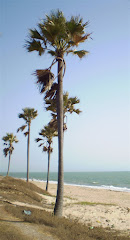At first I thought he was kidding. My favorite teacher at the primary school I was working with all last year was already the proud father of a precocious 2-year-old boy when he told me in the spring that his wife Yacine was expecting. “If it’s a girl we’ll name it after you,” he kept saying. I joked that he shouldn’t really, feeling unworthy of such an honor. I often forgot, as the weeks went by, that Yacine was pregnant at all, as by mid-May she had gone to Kaolack to stay with her mother and I only occasionally got bits of news from Monsieur Ndiaye about how she was doing. Soon I got caught up in the busy-ness of May, and by June was preparing to leave for my 3-week trip home to the States. The week before I was set to leave for Dakar, I went to school one of the last mornings before my trip and heard the good news. Monsieur Ndiaye wasn’t there that day, but the other teachers told me: it was a boy!
The next afternoon I was walking home from the mayor’s office when Monsieur Ndiaye rode up next to me on his best friend Sarr’s bicycle. “The ngenté [baptism party] is next Tuesday!” he told me, excited. “You have to come!”
“Right!” I said. “Congratulations!”
And then I remembered to ask, “What did you name him?” not having gotten that answer out of the teachers at the school.
“We named him after you!” said Monsieur Ndiaye, as he pedaled slowly along with my walking pace.
Named him after me? I wondered how that could be. Which of my names had he chosen? And now I should be at the baptism but it really wasn’t convenient.
“Well,” I hesitated. “But where are you having the ngenté?”
“It’s in Kaolack,” he answered. “Because that’s where her family is.” Kaolack is a big, hot, smelly city in the interior of Senegal, about a 3-hour trip from my site, and not on the way to Dakar, where I had planned to spend the next few days before leaving for the States. I was already going to Thiès for a weekend before going to Dakar, and Kaolack would just be one more leg on a trip where I was already carrying so much baggage.
“I don’t think I’m going to make it,” I told him sadly. “I will come and see him when I get back,” I promised, disappointed that such an important thing had come up at such an inconvenient time. But as Monsieur Ndiaye had always shown himself to be flexible as we’d spent the last year working together on environmental lessons and the school’s student government, he accepted that I had previous plans and told me he and Yacine would wait for my visit. As we said our goodbyes I asked him again what the baby’s name was, and as he pedaled away up the street he called back at me, laughing, “I named him after you!”
Fast forward 2 months. I had been to America and come back, school was out for the summer, and I hadn’t seen Monsieur Ndiaye since the end of June. It was August, a few weeks after I got back to site, and I was walking around town when I saw him hanging out by the market. “Hey! Ngoné Ndiaye!” I walked over and remembered at once that I had, somewhere, a child supposedly named after me. A baby I hadn’t seen. A living growing person. I greeted Monsieur Ndiaye, found out that everyone wass doing well, and that Yacine was still in Kaolack. I got ready to leave and decided to try again. “So… are you going to tell me what the baby’s name is?”
“We named it after you!” he said. “Well, you and Sarr, because he’s my best friend… and Yacine’s dad…” and it turned out that I have the honor of being a 1/3 namesake.
It was several weeks later until I heard that Yacine was back from Kaolack, and a week after that when I finally got around to visiting. I had been putting it off, not knowing what to bring, what to give, not having gone to the baptism. I felt bad, a poor excuse for a namesake. That afternoon I convinced my sitemate to go with me and together we walked up the steps to the Ndiayes’ apartment, meeting Monsieur Ndiaye at the door.
“Hey, Ngoné Ndiaye!” We were led into the living room, his 2-year-old bouncing in from the balcony to greet us. Yacine came in from the kitchen, happy to see me, holding the baby, as I admitted I was ashamed for not having brought anything. “I didn’t know what to bring!” I told them.
And all at once they reassured me.
“No, no!” they said. “You came! That’s all you needed to do.”
Relieved, remembering why we were friends, I sat down on the couch as Yacine handed me the baby.
I bounced him on my knee and looked at his chubby cheeks.
“So, Mamadou Mour Alexis Ndiaye,” I cooed. “How are you doing?”















